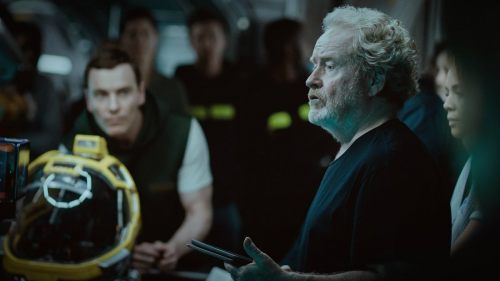ALL THE MONEY IN THE WORLD Review: Ridley Scott’s ‘How To Be Rich’
There's a theory that's been floated recently amongst the BMD staff* that goes like this: big budget epic/franchise filmmaking is the playground Ridley Scott goes to in order to brush up on his love of tech, and flex his muscles in peculiar pulpy ways, before returning to artier endeavors in-between. This trend runs through the whole of his filmography (juxtapose Matchstick Men ['03] and Kingdom of Heaven ['05] for example), but was crystallized with Prometheus ('12) - a technically sumptuous odd duck of a blockbuster reviled upon initial release (only to be re-evaluated less than a decade later). Prometheus was immediately followed by The Counsellor ('13): a crash course in insect politics courtesy of an ostentatious Cormac McCarthy screenplay, which revolved around hyper-articulate players in Mexico's drug cartels.
Exodus: Gods and Kings ('14) was an unfortunate misfire that nevertheless saw Scott playing with tremendous scope (just as he had on Gladiator ['00]) before shooting Matt Damon into space with a disco soundtrack in The Martian ('15), earning himself a Best Picture nomination. This year's wrongfully maligned Alien: Covenant is now the first part in a '17 duology from the director that includes All the Money In the World, a '70s true crime kidnapping period piece that plays more like black farce than it does a straight-ahead thriller. In fact, Scott hasn't made a movie this coldly misanthropic since The Counsellor; yet again shepherding us through a world where people are bought and sold just like any other commodity, feelings for each other damned to dust.
Adapted by David Scarpa from John Pearson's non-fiction account of the taking of John Paul Getty III (Charlie Plummer) at the hands of Italian terrorists, Scott isn't so much interested in the human aspects of the story as he is coldly conveying how Paul became a pawn for grandfather J.P. Getty (Christopher Plummer - replacing a disgraced Kevin Spacey) to publicly humiliate his mother, Gail Harris (Michelle Williams). Harris married into the Getty tribe, hitching her wagon to J.P.'s loser son (Andrew Buchan), who pisses away his position as Vice President of his oil man father's company, in favor of getting strung out on booze and opium in Morocco. But Gail was never really a 'Getty', and J.P. always viewed her need for custody following the divorce as snatching away children who shared his name and blood: a theft he could not abide.
So when Paul is kidnapped, Mr. Getty refuses to pay the ransom, thus forcing his keepers to stash him in a South Italy hideout for months on end, all while Gail stresses and J.P. hires fixer Fletcher Chase (Mark Wahlberg) to negotiate the price of his grandson's release down, like he would any other high profile business deal. Scott's lens is as coldly detached as the billionaire while discussing Paul's potential fate, more interested in how any sum of money he pays can be written off on his returns come tax time. Though the movie is essentially delivered with a straight face - regular Ridley DP Dariusz Wolski and composer Daniel Pemberton combining for maximum, gloomy portent - the levels to which this "negotiation" descend seem like Mr. Getty is buying a new sports car, not his family member's life. In the hands of the Coen Brothers, the intent would probably be purer, but Scott isn't interested in such a clearly defined playing field.
To be honest, while the legendary director's aloofness in regard to tone is totally admirable, it also muddies his message's overall delivery. While it's clear that he's critiquing a particular American capitalist mindset - with J.P. Getty being painted as a real life Daniel Plainview - he's doing so via a thriller that never actually thrills, and a comedy that never actually lets you know it's OK to laugh at what's happening on screen. The mechanisms of the plot are clear, but there are almost zero action beats in the otherwise routine crime narrative. Like The Counsellor, All the Money In the World often feels like a conscious rejection of what we've come to expect from this type of pulpy storytelling, reveling in metaphor and murky morality, rather than delivering any semblance of legitimate escapism or catharsis.
Even the usual visual splendor of Scott's filmography is dialed down. All the Money In the World is much more American Gangster ('07) than it is Hannibal ('01) - the opulence of its subjects' lavish lifestyles somewhat muted by an oppressive blue color palette. Even the jaunt to Italy - a location Scott's exploited in the past for all its Old World majesty - is relegated to farm houses and dark, cobbled streets. The flashiness is conveyed mostly through Mr. Getty's cavalier attitude toward not only the situation at hand, but human beings in general, at one point admitting to collecting "beautiful things" and discovering value in them much easier than he ever has in people. This King of the World has no time for men, and Scott is unsubtly mocking his arrogance from behind the camera.
What isn't lacking are the performances. Williams is doing a rather splendid Hepburn impersonation the whole time - amalgamating both Katharine and Audrey into a single woman, strong yet vulnerable while desperately pining to have her son back in her arms. For all the ink already spilled regarding Plummer replacing Spacey (following the actor's alleged sexual misconduct), what's most remarkable is how seamless his integration into the final product is. Plummer - who was apparently Scott's first choice for the role to begin with - totally owns Getty's icy lack of feeling, a wealthy man whose every gift to even the ones closest to him come with lengthy strings attached. If anyone falters it's Wahlberg, whose ex-CIA man seems less like an effective tool in Getty's box than he does another empty shirt, whose eventual rise to heroism is the one moment in All the Money In the World that rings totally false.
All the Money In the World is the very definition of a "minor work"; solid enough for fans of Scott's overall output to admire, but never in danger of becoming heralded as some "unsung masterpiece" down the line (though, at the rate we reappraise everything, anything is possible). However, Scott continuing to parlay his status as a major Hollywood icon into getting these rather idiosyncratic projects greenlit by studios is undeniably impressive. Most artists in their twilight years - the man just turned 80 two weeks ago, after all - would be content playing it safe (or not playing at all, frankly). But Scott continues to push himself into unconventional territory, seemingly never content with just being a blockbuster elder statesman. The quality of these final products may fluctuate, but their variety makes for one of the most fascinating "late periods" in recent memory.
*Namely by one Phil Nobile, Jr.



